The Mountain Jews stand out in this regard. So, what is the secret of the Jews having such a strong attachment to our country? Unlike Europe and various other parts of the world, Jews never have to deal with anti-Semitism in Azerbaijan. How do they organize their worship? We visited the Synagogue of Mountain Jews in Baku to find answers to these questions.
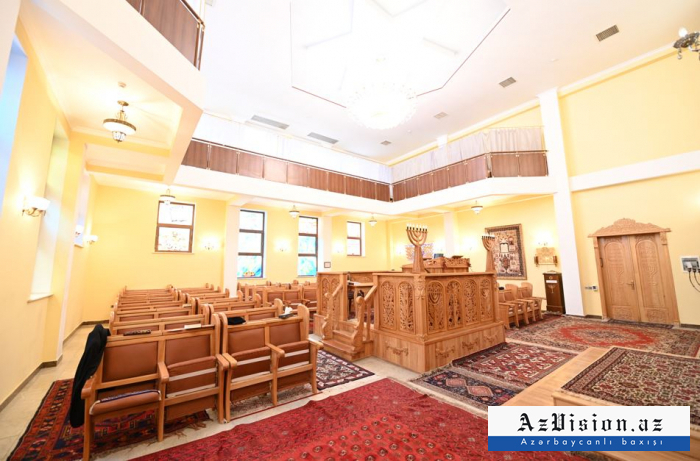
Milikh Yevdayev , Head of the Mountain Jews Community in Baku, says everyone can pray comfortably in the House of God. While Baku administration carried out fundamental reconstruction and restoration projects in Baku in 2010, they revealed an urgent need to build a new synagogue for Mountain Jews. The project launched through President Ilham Aliyev’s initiative and care. They held the opening ceremony for the new synagogue a year later, on 5 April 2011, attended by officials, heads of religious communities in Azerbaijan, members of the Jewish community, as well as guests from Israel, Russia, and other countries. Interestingly, the synagogue stands out from other Jewish temples in the entire region with its architectural features and dimensions.
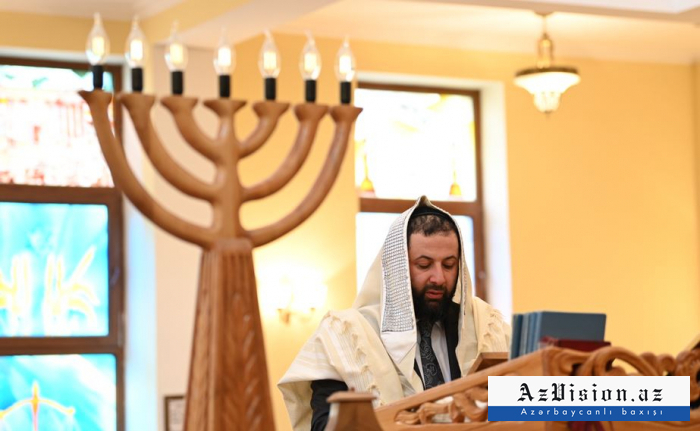
Azerbaijani Jews have one more important reason to celebrate. President of Azerbaijan has issued a decree to start the construction of a Jewish religious cultural centre.
Yevdayev reminds that Jews have inhabited these lands for over two and a half millennia: ‘As we arrived in Azerbaijan, we mainly settled in the foothills of Shahdag. This must be the reason why we were termed as the ‘Mountain Jews’. Our mentality is also very similar to that of the local mountain people. We hold sacred the same things they consider holy. We have cohabited with all nationalities here in the spirits of peace, tranquillity, and brotherhood for many centuries. Azerbaijan is our Motherland, while Israel is our historic homeland. Our sages say: ‘Happy are those, who are happy at home.’ Azerbaijan is our home. Our children joined the sons of other nationalities here to fight in the First and Second Karabakh War. We have a hero as Albert Agarunov. We inaugurated a beautiful statue of him on the street named after him years ago. When I was in Karabakh, I put forward an initiative to name a little square after him and erect his bust in Shusha. I also suggested placing a plaque where he fell as a martyr while defending Shusha. My proposal has found calls of support in parliament.’
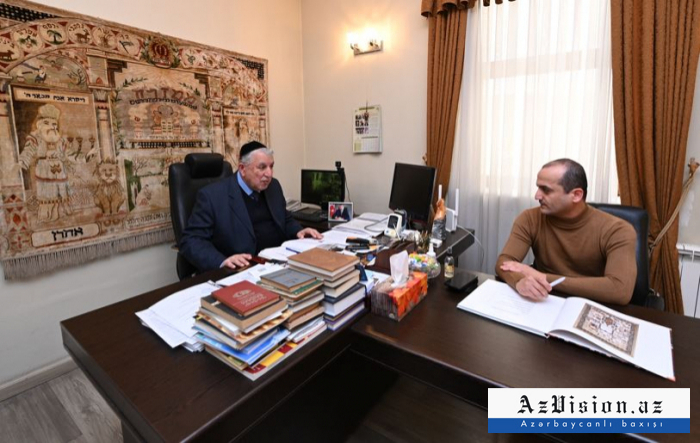
The head of the community remarks that he has never yet witnessed any discrimination or pressure against the Jews here. He has neither heard such stories from his elders, nor come across any mentions of such in historical documents.
The synagogue is maintained at a high level. The state allocates financial aid annually to support the activities of the community, which was 350,000 manats last time. Milikh Yevdayev continues to say that our country financially supports not only Mountain Jews, but European and Georgian Jews as well. The funds extended for the Mountain Jews are used to support the communities in Guba, Oghuz, and Ganja: ‘Such state care allows us to maintain the synagogue and community life at a high level. I have spoken of it during my trips to Israel and all countries I visit. Many would not even believe that such support could be real.’
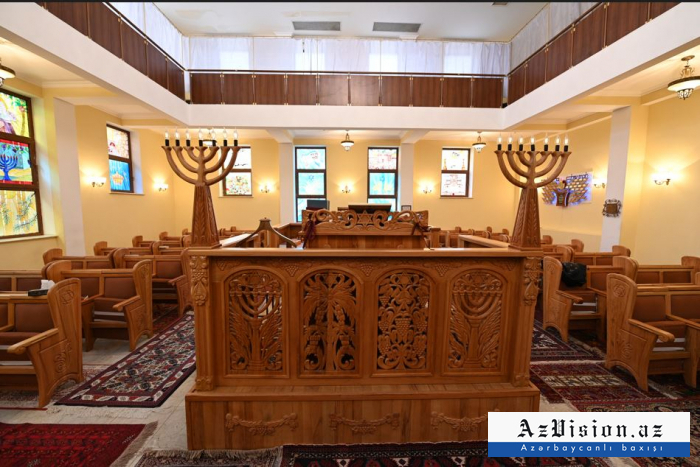
The head of community says that the synagogue has had many applications to convert to Judaism: ‘But I do not support such things. Those who change their religion once, will do it a second time…’
The community also uses the allocated funds for charity events, such as financial assistance to over 300 families each month.
‘Places of worship that we call houses of God are considered the last haven of salvation for people. I have always tried not to have anyone who enters the synagogue leave disappointed. The faith and nationality of our visitors do not matter in the least. Everyone is equal for us. The synagogue helps many non-Jews who are sick and homeless’, he notes.
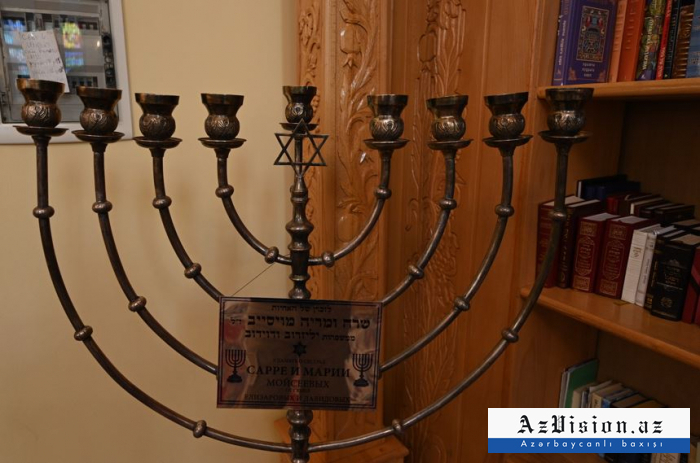
The communal worship requires a quorum of Jews to congregate. They are not performed if there are less than 10 worshippers at the synagogue: ‘We call this minyan. Our board has decided to allocate financial support and cover the travel expenses of the 14 people who make up our minyan. These people gather at the synagogue every morning and evening and travel from all over Baku. The travel expenses used to be 80 manats. The sum later increased to 100. It makes up 130 manats today. We also serve hot breakfast to our congregation every morning. Women sit on the second floor of the prayer hall.’
Young rabbi Avraam Yakubov leads the service at the synagogue. He has worked here since 2013. Avraam graduated the Jewish college in Guba and interned in Moscow and Israel. The head of community considers him a promising rabbi.
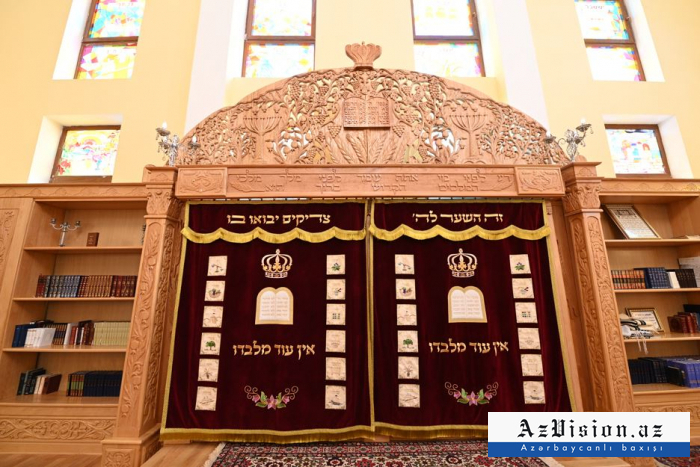
Performing religious rites is not the only freedom Jews enjoy in Azerbaijan. They can walk comfortably in the streets in their national and religious attire and their hats, the kippahs. The same is not true of other countries. Religious intolerance is particularly rampant in Europe, as was confirmed by the head of community: ‘I tried walking around in a kippah when I was in Paris once. I was warned to be careful about it while in France, meaning anything could happen in the streets. Moreover, we had to go through a special corridor guarded by men with machine guns to enter a synagogue in France. Armed and armoured men stood every 10 metres to guard the house of God. Can you ever come across such a thing in Azerbaijan? Never!’
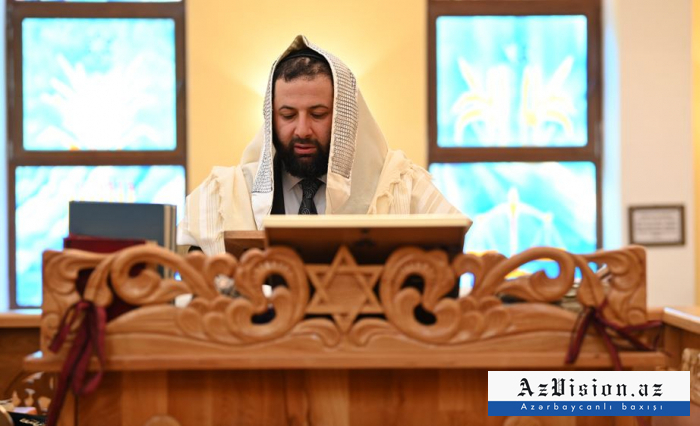
My interviewee also recalls of how amazed their French visitors were about Jews observing the Shabbat in Baku: ‘I once was at an important event in France, attended by over 400 people. The Paris rabbi there said that they became French when they went out and could only be Jews at home. When I was given the floor, I addressed the rabbi and said that in Azerbaijan we had the privilege to be a Jew both inside and outside our homes, unlike them .’
Milikh Yevdayev also remembers a visit by a special delegation from abroad to Azerbaijan. They were tasked to draw up a report on our country. The head of community took the guests to Guba and talked of the conditions in the Red Settlement: ‘I gave them a piece of advice upon our return. I said there was evil both here and there. But yours are more dishonourable than ours, I said: ‘I have one little request. Please record what you have seen, not what you wish to write. I do not ask of you to praise us. We do not need that. But be honest in your report and record what you’ve observed.’ Then they returned and wrote the opposite of what they had seen.’

The head of community also criticizes the ‘shortcomings’ of the US State Department: ‘Do we not have freedom of religion? They simply see what they want to see.’
Milik Yevdayev says double standards against Azerbaijan are not a recent occurrence. We have often come across them over the past thirty years both in religious and political contexts. He has not seen a single positive action either by the OSCE or any other international organization on Azerbaijan’s righteous cause in 30 years: ‘Mr. President has always mentioned this in his speeches. No one got angry with us as long as we did not win and restore justice by force. Whereas now, every successful step taken by our people and state seems to infuriate the states and certain circles that do not like us. We have finally established a strong stance among other countries in the world. Our country is seen as an obstacle for the policies of those states. The stronger we grow and resist, the more irritation we inspire. Even if we reach a peace agreement with Armenia, they will still not leave Azerbaijan alone. These double standards have, do, and will continue to exist. There is a saying of the wise: ‘Justice is about power. You cannot find justice where there is no power.’ We could also restore justice only through force.’
Tural Taghiyev
Photo
More about:






































































